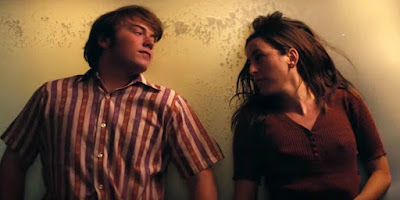Gary meets Alana at this school on picture day where she is working as a photographer’s assistant and sashaying through the breezeway in a miniskirt, recounted in a tracking shot framing Alana Kane as much as Alana Haim like a movie star. This deliberate Hollywood sensation is furthered in Gary being a child actor, fancying himself a movie star, just sort of slipping into the shot and bantering with her as if he’s reciting dialogue from a screenplay inside his head. She meets him on his wavelength by essentially improvising as a scene partner, their chemistry emitting a conspicuous flirtatious charge. That’s why it makes sense when she accepts his offer to meet him at a mahogany-lined steakhouse, a distinctly grown-up location at once at odds with his age but in right line with his air. “What are your plans?” he asks, establishing his insistently adult persona and simultaneously underlining her lack of one.
He’s 15, but acts older; she’s 25, but acts younger. It’s as if he’s longing for the promised land of adulthood without realizing it will eventually harden into Alana’s lack of a rudder, laying bare the eternal conundrum of youth being wasted on the young. That horizon line of adulthood is a hazy thing in “Licorice Pizza.” Gary might be in high school but homework comes across less valuable in this environment than hustle. Indeed, as his child acting star wanes in auditions gone awry, he re-imagines himself as a merchant, going into the waterbed business with Alana, born from a groovy salesman pitching such aqua mattresses as “the future”, a wry evocation of what constitutes the future to a horny teen. This would all be unintentionally ridiculous if not for Hoffman’s impeccably purposeful ridiculous braggadocio, though what lurks beneath the character is less clear, his surname underlining how lovingly and uncritically Anderson views him. Alana is more fully realized, which is to stay she struggles with self-realization. Look at the way she hunches over the wheel of her car when she drives, you can practically feel this pent-up aggression rising off her. She has a fury to burn with her lot in life, but Haim never lets it shade into bitterness. There is too much joy, like the whole world is her canvas, and when she makes a few marks she doesn’t like, she just tears off the page and starts again.
That feels true to “Licorice Pizza’s” lack of a straight-forward plot, built out of incidents, Anderson taking his cue from the movie’s parody of William Holden, Jack Holden (Sean Penn, reminding us how he can excel at having fun and having fun with himself), who insists on recklessly recreating one of his movie stunts at a golf country club. Sometimes the whole movie just seems to exist as an opportunity for Anderson to dare himself, like the sequence in which circumstances force Alana, with Gary riding shotgun, to pilot a truck that has run out of gas in neutral through the hilly streets, the lack of music, immense sound design and tense editing create an unexpectedly, deliciously thrilling moment. In a way, “Licorice Pizza” becomes a kind of antithesis of Stephane Lafleur’s “You’re Sleeping, Nicole.” Filmed in a dreamy black and white, that 2014 French Canadian indie was about a young woman on the cusp of adulthood sleepwalking through her summer, the conclusion emblemizing the emotional geyser that has been rumbling within. “Licorice Pizza”, on the other hand, in Anderson’s 70mm sepia tones is the exact opposite, a summer that is all action, recurring explosions of emotion.
That’s not to suggest Anderson is merely looking through nostalgia-tinted glasses. The 1973 Oil Crisis puts a significant dent in Gary’s waterbed trade and though initially there is a kind of vintage royal glow to Jack Holden, his increasingly deranged behavior gradually mutes that glow. It’s a parody of Old Hollywood giving way to a parody of New Hollywood as a coked up, crazed mess in Bradley Cooper’s even more deranged turn as Jon Peters, this all-of-a-sudden, small subplot becoming a virtual monster movie where Gary and Alana, having delivered a waterbed to his residence, can’t escape him. This is the scene triggering their getaway in the truck running on empty, which concludes with Alana sitting by herself on a curb, watching Gary and his adolescent compatriots celebrate their survival by waving gas can nozzles in the manner of their genitalia in the middle of the street.
Like Alana telling a pack of teenagers to “Fuck off”, it’s one of several moments when you see Alana weighing her inability (refusal) to grow up, punctuated by her noticing an advertisement for a local politician, Joel Wachs (Benny Safdie), running for Mayor, impulsively deciding right then and there to join his campaign. In another movie this would have triggered Alana finding herself, as the saying goes. Instead it climaxes with her character dispatched on something of a melancholy public relations quest and another character, pointedly a man, telling her who she is, what she is, mirroring a similar moment with Jack Holden. In truth, Alana does not know herself any better than she does at the movie’s start, revealed in Haim’s demeanor, and leading to the movie’s conclusion which comes on as much a balloon bursting as it does a hot air balloon floating away.





No comments:
Post a Comment